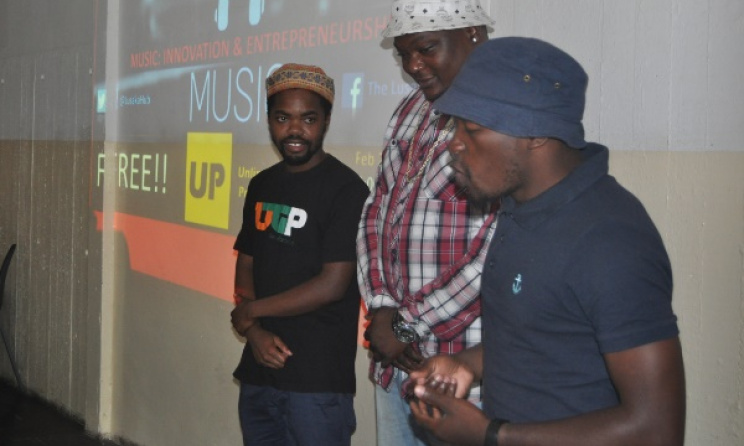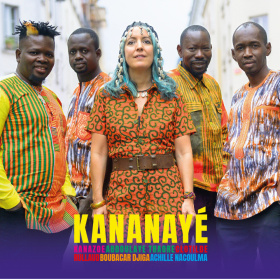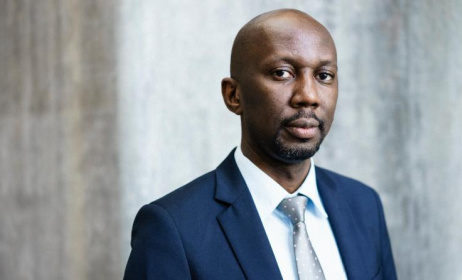Entrepreneurship workshop boosts Zambian music industry
Some countries utilise music to contribute to economic growth and change society for the better, while also recognising music as a professional career. In Zambia, however, the potential of the arts - particularly music- remains largely untapped. This question is, why?
 Zambian music professionals listen closely at the workshop. Photo: Joseph Tembo / joetembo.blogspot.co.za
Zambian music professionals listen closely at the workshop. Photo: Joseph Tembo / joetembo.blogspot.co.za Zambian producers Raydo, Shom C and Paul Kruz at the workshop. Photo: www.lusakahub.net
Zambian producers Raydo, Shom C and Paul Kruz at the workshop. Photo: www.lusakahub.net Participants of the recent music workshop in Lusaka, Zambia. Photo: Joseph Tembo / joetembo.blogspot.co.za
Participants of the recent music workshop in Lusaka, Zambia. Photo: Joseph Tembo / joetembo.blogspot.co.za
The Lusaka Hub recently held a two-day Music Innovation and Entrepreneurship workshop for artists, promoters, managers, producers and radio presenters. Held at the University of Zambia on 20 and 21 February, the UP (Unlimited Potential) workshop was aimed to developing music entrepreneurs and helping artists to become “pro-active opportunity creators”. The workshop also provided some answers to why arts-related avenues in Zambia remain largely untapped.
The entrepreneurial initiatives presented by Macpherson Mutale, president of the Youth Advocacy for Skills Training and Education Network (YASTEN), focussed on developing revenue-generating music-based businesses, developing meaningful arts-based legacy projects and increasing impact of the music at local and international level.
Making the artists, producers, promoters and managers attending the workshop understand that the music industry relies on royalties generated by the licensing of copyrighted songs and recordings as a primary form of payment for musicians was one of the key points addressed at the workshop. Intellectual property law and licensing systems have gone through significant adjustments over recent years as a result of the rise of digital music, but much of the industry’s historic legal framework remains unchanged.
In his presentation, local industry expert Gibson Phiri said there is need to stimulate economic development in Zambian music, most importantly to help people in the music industry realise the potential in them, grow the music industry and earn more money for their work.
The workshop was also attended by James Chamanyazi from the Zambia Music Copyright Protection Society (ZAMCOPS). In his presentation he said in order to develop the music industry, there is need to engage with musicians and other stake holders such as the Intellectual Property Unit of the Zambia Police, the country’s anti-piracy crack squad, the Ministry of Information and Broadcasting, the Zambia Revenue Authority, as well as recording studios, music publishers and the general public.
Slam Dunk Records CEO Duncan Sodala (aka The Holstar), well-known for having achieved great heights in music managing the rap group Zone Fam, said the lack of management has greatly contributed to the number of artists who fail to sustain their music careers, despite their talent. Holstar blamed the trend of artists wanting to do everything by themselves for the lack of development in the Zambian music industry.
Three of Zambia’s top producers - Raydo (Digital X), Shom C (Zero dB) and Paul Kruz (UGP Records) - shared their experiences and called for greater commitment from various stakeholders to equip music industry players with the entrepreneurial skills and mindset needed to carve out professional musical careers.
The second day of the workshop focused on the need for musicians to constantly think in innovative ways to engage audiences - and that innovation is essential for the arts to continue to be both a force for positive change in Zambian society as well as a source of income.
The workshop was a resounding success and was well-received by those who attended. For them it was a first step towards tapping into arts-related avenues for earning, as well as finding solutions to the challenges currently facing the Zambian music industry.
Originally published on 25 February 2016 by Lusaka Hub.






























Commentaires
s'identifier or register to post comments